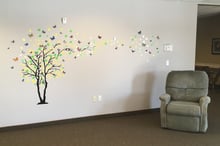6 ways memory care enhances each moment
Amy Weiss | Mar 25, 2021

At Walker Methodist, we’re passionate about Life. And all the living that goes with it. That’s the mission behind all we do, including our enhanced Kaleidoscope memory care program. We believe people with memory loss can still live meaningful, fulfilling lives. Every moment is important, and joy can be found in each day. Here are six ways Kaleidoscope helps residents experience beauty and happiness in this stage of life:
-
Aromatherapy
Even though loss of smell can be part of aging, aromatherapy is still beneficial. During aromatherapy, molecules travel through the nose to the limbic system. Whether or not one can smell the oils being used, the results are the same. The limbic system supports a variety of functions, including emotion, behavior, motivation, long-term memory, and olfaction. According to the Mayo Clinic, aromatherapy may offer relief from anxiety, stress, or depression; improve quality of life; and improve sleep. Other studies suggest aromatherapy can be especially beneficial for people with memory loss or dementia.
-
Healthy, delicious food

In our Kaleidoscope program, snacks and meals are centered around superfoods. Superfoods are nutritionally dense and healthy (for example, blueberries, salmon, or kale). Research also shows that a diet rich in omega-3s can benefit those with memory loss. We know food is more than a physical need—it’s about community. From birthday celebrations to comfort food, our culinary team knows the power of food to not only bring back memories but create happiness.
-
Indoor gardens
Thriving, colorful indoor gardens offer many potential benefits to residents:
- Sensory stimulation
- Improved strength and balance
- Providing a sense of responsibility and purpose
- Opportunities for social engagement
- Improved quality of life
Additionally, residents can enjoy outdoor gardens during warmer months. Plants that attract butterflies, as well as butterfly gardens, create a sense of community and beautifully illustrate the journey through memory loss.
-
Light therapy
Circadian rhythms are our bodies’ natural sleep-wake cycles. These rhythms change as we age, which can lead to sleep problems for older adults. To help improve a resident’s sleep—and promote increased enjoyment when awake—our team uses light therapy.
A study from the Lighting Research Center found that light therapy “can consolidate and improve nighttime sleep efficiency, increase daytime wakefulness and reduce evening agitation without the adverse effects of pharmacological solutions.” This simple yet effective therapy can make a significant difference in the lives of residents and their loved ones.
-
Tactile art

Kaleidoscope communities will also have beautiful, interactive art and art activities. Trees with bright, removeable butterflies offer residents an engaging sensory experience. Other activities, like painting, allow residents to express themselves, show emotion, and display their creativity. These crafts often turn into something much more, like Highview Hills’ memory wall.
-
Music & MemoryTM
Where medications have failed, music has succeeded. Music helps more than people with memory loss. It helps their families, caregivers, and friends. We are true believers in Music & Memory™, providing residents with memory loss with iPod loaded with personalized playlists. This program has been shown to improve moods, increase quality of life, reduce stress, and more.
Memory care is about moments
At Walker Methodist, we don’t just take care of people with memory loss or dementia. We see their value and recognize their worth in this stage of their lives, journeying with them in each moment. We not only meet their physical needs, but we care for the needs of the person as a whole being.
If you have a loved one who is experiencing this transformation, reach out to our team today and learn how we can help enhance their lives, even during this time of change.

